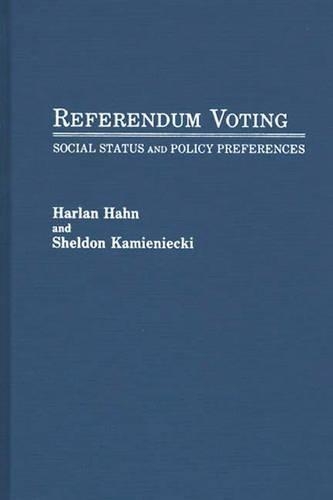
Referendum Voting: Social Status and Policy Preferences
(Hardback)
Publishing Details
Referendum Voting: Social Status and Policy Preferences
By (Author) Harlan Hahn
By (author) S Kamienicki
Bloomsbury Publishing PLC
Praeger Publishers Inc
6th November 1987
United States
Classifications
Tertiary Education
Non Fiction
328.2
Physical Properties
Hardback
182
Description
Once a prominent feature of most theories on the structure and function of political systems, in recent years, social class or status has become one of the most neglected variables in research on contemporary American politics. This study analyzes the relationship between social status and referendum voting in an effort to refocus attention on social stratification in political science.
Reviews
." . . In the latest addition to this expanding literature Hahn and Kamieniecki analyze the role partisanship and especially social status played in more than 200 different types and referenda elections held in some 40 US and several Canadian cities from 1955 to 1970. Their analysis of census and referenda data reveals a significant and consistent association between increasing status and approval of expenditure and nonexpenditure issues. Moreover, in considering possible long-term demographic changes, the authors conclude that The referendum can be a meaningful alternative for citizens, especially the powerless, the initiate social change . . . and [to modify] fundamental political institutions. Overall, this is a readable and thoroughly referenced study; it is also a very specialized study based on elections held nearly 20 years ago."-Choice
. . . In the latest addition to this expanding literature Hahn and Kamieniecki analyze the role partisanship and especially social status played in more than 200 different types and referenda elections held in some 40 US and several Canadian cities from 1955 to 1970. Their analysis of census and referenda data reveals a significant and consistent association between increasing status and approval of expenditure and nonexpenditure issues. Moreover, in considering possible long-term demographic changes, the authors conclude that The referendum can be a meaningful alternative for citizens, especially the powerless, the initiate social change . . . and [to modify] fundamental political institutions. Overall, this is a readable and thoroughly referenced study; it is also a very specialized study based on elections held nearly 20 years ago.-Choice
Though social class once played a prominent role in theories explaining American voting behavior, its influence has waned in recent times, note political scientists Harlan Hahn and Sheldon Kamieniecki. Having spent four years researching historical results of referenda, initiatives and recalls, which early in the century were the most heralded instruments of democracy, they recommend a return to concepts of elites versus the masses in analysis of American politics.-National Journal
"Though social class once played a prominent role in theories explaining American voting behavior, its influence has waned in recent times, note political scientists Harlan Hahn and Sheldon Kamieniecki. Having spent four years researching historical results of referenda, initiatives and recalls, which early in the century were the most heralded instruments of democracy, they recommend a return to concepts of elites versus the masses in analysis of American politics."-National Journal
Author Bio
HARLAN HAHN is Professor of Political Science at the University of Southern California. SHELDON KAMIENIECKI is also Professor of Political Science at the University of Southern California.
